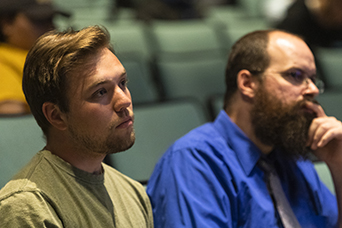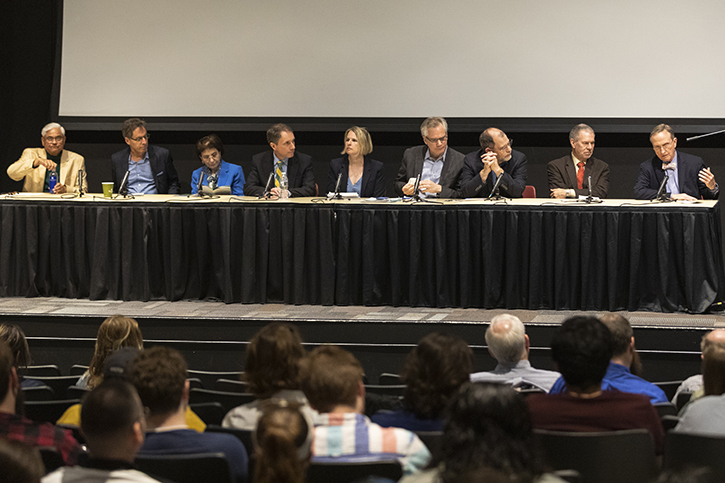As a distinguished panel of George Mason University faculty members assembled for “Climate 3.0: The Science, the Politics, and the Policy Agenda,” the most striking aspect for student Lauren Agnello was the diversity of voices.
The junior sociology major and member of Mason's Honors College, who was one of the event organizers, said the panel’s makeup was no accident, and she hoped the students in attendance would notice as well.
“I’m not a STEM [science, technology, engineering and mathematics] major, and I’m not particularly into science more than the average person,” Agnello said. “But I’ve seen that it doesn’t really matter where your area of expertise is; you can still have a role to play in protecting the Earth. It doesn’t matter what you’re studying. It doesn’t matter what you feel you’re good at. Right now, it just matters what you care about.”
About 150 people attended the Earth Day event, held in the Johnson Center Cinema, which was a collaborative effort of Mason’s Center for Ocean-Land-Atmosphere Studies (COLA), Mason’s new Institute for a Sustainable Earth and Roosevelt @ Mason, a nonpartisan student policy organization.
Nine faculty members, including Jagadish Shukla, Thomas Lovejoy, Andrew Light, Tyler Cowen and Ed Maibach, made presentations. They covered topics such as climate science, climate mitigation, climate adaptation, climate communication, climate policy and why climate change is a public-health issue.
Robinson Professor of Public and International Affairs and Pulitzer Prize-winning columnist Steven Pearlstein moderated the panel.

Ben Rhoades and Richard Todd Stafford attended the "Climate 3.0: the Science, the Politics, and the Policy Agenda" panel on April 22. Photo by Lathan Goumas/Strategic Communications.
“Mason should be at the forefront on one of the major issues of all time,” said Lovejoy, a world-renowned conservation biologist and University Professor of Environmental Science and Policy. “It has incredible talent, and it’s based here, literally, a stone’s throw from the nation’s capital. The ability to have really bright intellectual activity and translate it into change is particularly promising at Mason.”
And because climate change will touch humanity in so many ways, especially its sustainable and equitable development, the multidisciplinary aspect of the event was imperative, said Shukla, COLA’s managing director and the Distinguished University Professor who oversaw the event.
“Climate change is one of the most serious issues facing our civilization,” he said. “It involves science. It involves health. It involves economics.”
At Mason, it also involves students, and a workshop after the formal presentations produced a broad outline of measures students would like the university to adopt. Those include better access to sustainable practices such as composting, better placement of trash cans and recycling bins around campus and the end of Styrofoam use by Mason Dining.
Agnello, Roosevelt @ Mason’s president, said her organization will formally present the recommendations to the university in the near future and hopes “whatever we commit to, we stick to.”
That sentiment is exactly what those on the panel wanted to hear.
“What I’m hoping is when they are sitting in the audience today, they can project an imagined future for themselves where they are committed to this issue, where they are committed to doing something about it,” said Light, a University Professor of Philosophy, Public Policy and Atmospheric Studies. “Just about everything you do in almost every career path can be something that works on the solution side of this problem.”
“I am certain,” Lovejoy said, “there are pieces of the solution we don’t even know about.”
Which is why, when considering climate change solutions and implementations, he is optimistic.
“There’s no other choice,” he said. “Otherwise, you don’t try.”

Nine professors from various disciplines participated in the "Climate 3.0: the Science, the Politics, and the Policy Agenda" panel on April 22. Photo by Lathan Goumas/Strategic Communications.
